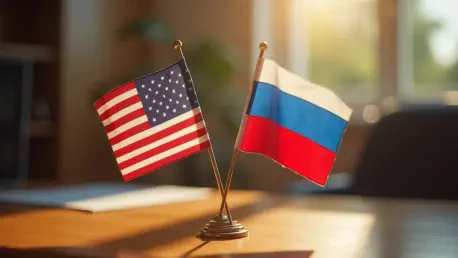In a dramatic turn of diplomatic engagements, Russia’s Foreign Minister Sergey Lavrov recently announced the possibility of another prisoner exchange between the United States and Russia. This revelation was made during Lavrov’s visit to Turkey, amidst ongoing tensions primarily fueled by Russia’s military involvement in Ukraine. The announcement adds a complex layer to the fragile relations between the U.S. and Russia, as leaders navigate a web of international diplomacy, accountability, and strategic interests.
Diplomatic Moves Amid Heightened Geopolitical Strain
Lavrov’s announcement occurs during a tense period following former President Trump’s pointed criticisms of President Putin’s aggressive maneuvers in Ukraine. The potential swap, though not yet detailed, could symbolize a paradoxical mingling of accusations and attempted reconciliations. Russia’s military actions since its invasion of Ukraine in February 2022 have cast a long shadow over diplomatic proceedings. With Trump’s expressed discontent over the enduring hostilities in Ukraine, diplomatic relations continue to evolve and challenge traditional negotiation paradigms. Lavrov, in his message, speaks favorably of Trump as a leader but hints at challenges posed by various international players that dilute Trump’s proactive stance.
The potential prisoner swap is poised to become a significant marker of relations between the two nations. Though the White House National Security Council has not yet made any official comment, the prospective exchange underscores the intricate diplomatic dance occurring against a backdrop of robust political rhetoric. Lavrov’s words, paired with Trump’s call for renewed dialogue between Russian and Ukrainian leadership, illuminate the broader dynamics at play within the international sphere.
Key Dialogues and Symbolic Gestures
Within the essence of these high-stakes discussions lies the broader strategic dialogues engaging both countries. The exchange comes against a history marked by an earlier swap under Trump’s administration that saw the release of American Marc Fogel. This recurring theme of prisoner swaps serves as a poignant reminder of the multi-layered diplomatic measures leaders utilize to navigate ongoing geopolitical puzzles. Despite the lack of concrete details about the individuals involved in the proposed swap, the act itself is emblematic of complex diplomatic strategies that seek to balance public and private international interests.
Panel discussions and diplomatic engagements have also reflected these motifs, spiraling around themes of accountability, sovereignty, and the long-roaded path toward potential resolutions in Ukraine. Experts continue to weigh in on the potential ramifications of such diplomatic moves, offering insights into the subtle, often obscured maneuvers that shape global power dynamics. This external dialogue highlights differing perspectives on leadership styles, strategic persistence, and adaptability in resolving international disputes.
Workshops, Activities, and Technological Insights
At the heart of discussions lies an array of activities and workshops designed to foster communication and understanding between U.S. and Russian policymakers and strategists. These engagements, although wrapped in a highly charged political setting, offer a platform for analyzing the current state and prospective future of U.S.-Russia relations. The interplay between formal diplomacy and interactive forums provides fertile ground for thoughtful discourse aimed at clarifying prevailing ambiguities.
In parallel, technological advancements and insights are starting to influence the broader spectrum of international relations. Whether innovations in surveillance, communications, or information dissemination, these technological threads weave distinct narratives alongside traditional diplomatic channels. As policymakers and technology experts converge to explore these new frontiers, the critical role of innovation may redefine traditional norms within international diplomacy.
Analyzing Future Trends and Geopolitical Impacts
These events carry significant potential implications for future geopolitical trends, with the current administration working diligently to recalibrate its approach to global threats and alliances. The move toward additional prisoner exchanges marks an opening for dialogue even amid strained relations, signaling potential pathways for cooperation or turmoil. This dynamic juncture reflects how high-level diplomacy may influence broader geopolitical trajectories, thereby shaping the landscape of global relationships.
The reaction to recent announcements further illustrates the nuances involved in U.S.-Russia interactions. Understanding these shifts provides a crucial lens through which broader regional and global power dynamics can be interpreted. By following the unfolding situation, policymakers, experts, and observers alike gain valuable insights into how leadership doctrines and strategic pivots may direct global peace and stability efforts.
In summary, the announcement of a potential U.S.-Russia prisoner swap amid Ukraine tensions represents a significant moment in international relations, illuminating the ever-complex balancing act of diplomacy and strategy. The event underscores the ongoing importance of multi-faceted diplomatic efforts aimed at resolving longstanding geopolitical challenges. As the global community continues to observe the unfolding developments, the necessity for innovative thinking and collaborative engagement remains paramount.









